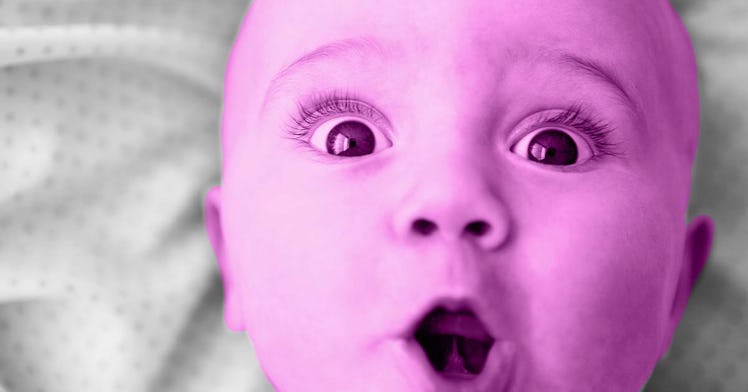When Do Babies Start Cooing?
There's a reason we pay attention to this noise over most of the others they make

Gurgles, toots, cries, and, grunts. Newborns and infants make a lot of different sounds, and each hit the ear in their own unique way. Cooing tops the list in regard to those sounds that elicit a positive emotional response from parents and is one of the earliest fun sounds that babies make. But when do babies start cooing?
When Babies Coo
Babies are expected to start cooing at about two months. These are some of the first vocalizations a baby makes that don’t indicate they have a pressing need or are otherwise uncomfortable. As babies learn that they can control their own vocalizations as well as voluntarily move their own lips, they also learn they can control bigger humans. Cooing is simply adorable and bound to elicit positive and pleasing response from any adult within earshot.
More than just delightful, cooing is the first stage in a baby’s language acquisition — followed by babbling and eventually recognizable words. Essentially, cooing becomes more complex over time as babies learn to mimic vowel sounds they hear from the adults who care for them.
Why Coo?
While science hasn’t figured out why babies coo, Mary K. Fagan from the Indiana School of Medicine notes it might be simply because they like to hear themselves. Fagan reached the conclusion while considering babies with cochlear implants for a study published in 2014 in The Journal of Experimental Child Psychology.
“Before cochlear implantation, infants with profound hearing loss vocalized significantly less often than hearing infants,” Fagan noted. “However, soon after cochlear implantation, they vocalized at levels commensurate with hearing peers.”
What if My Baby Isn’t Cooing?
A baby that isn’t cooing may have hearing issues, Dr. Caitlin Raaz, Assistant Profesor of Audiology and Speech-Language Sciences at the University of Northern Colorado. “We always make sure a child has had recent hearing testing when there are speech and language concerns present,” she says. “Even chronic ear infections can lead to issues here. I often describe it to parents as ‘hearing underwater’ because the fluid in the ears can cause speech sounds to be muffled, therefore making them difficult to understand and produce themselves.”
What Should I Do When My Baby Coos?
When your baby starts cooing, don’t be shy. Warm-up that Roger Rabbit impersonation and start cooing back. Eventually, your baby will start to mimic the cooing sounds you are making, giving you early opportunities for purposeful interaction.
If you just can’t bring yourself to that level of silliness, simply talk, sing or otherwise communicate as much as possible in front of your child. Language acquisition is interactive. Cooing is the start of a conversation that could last a lifetime.
This article was originally published on